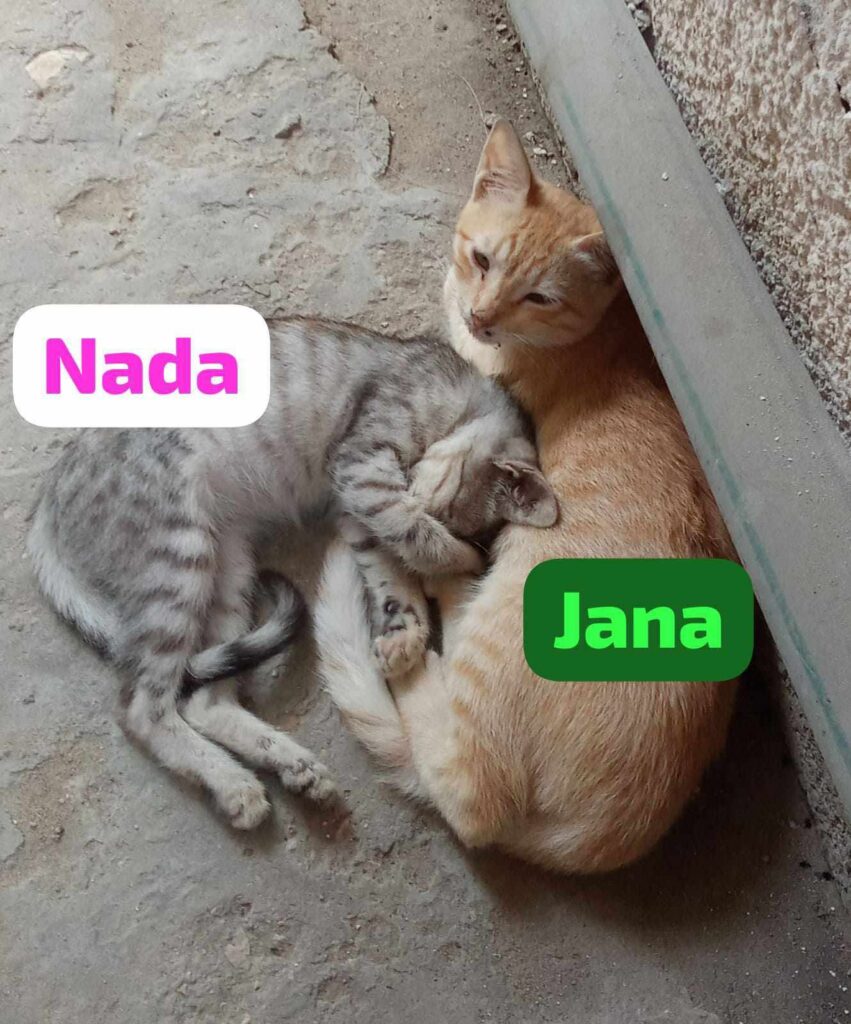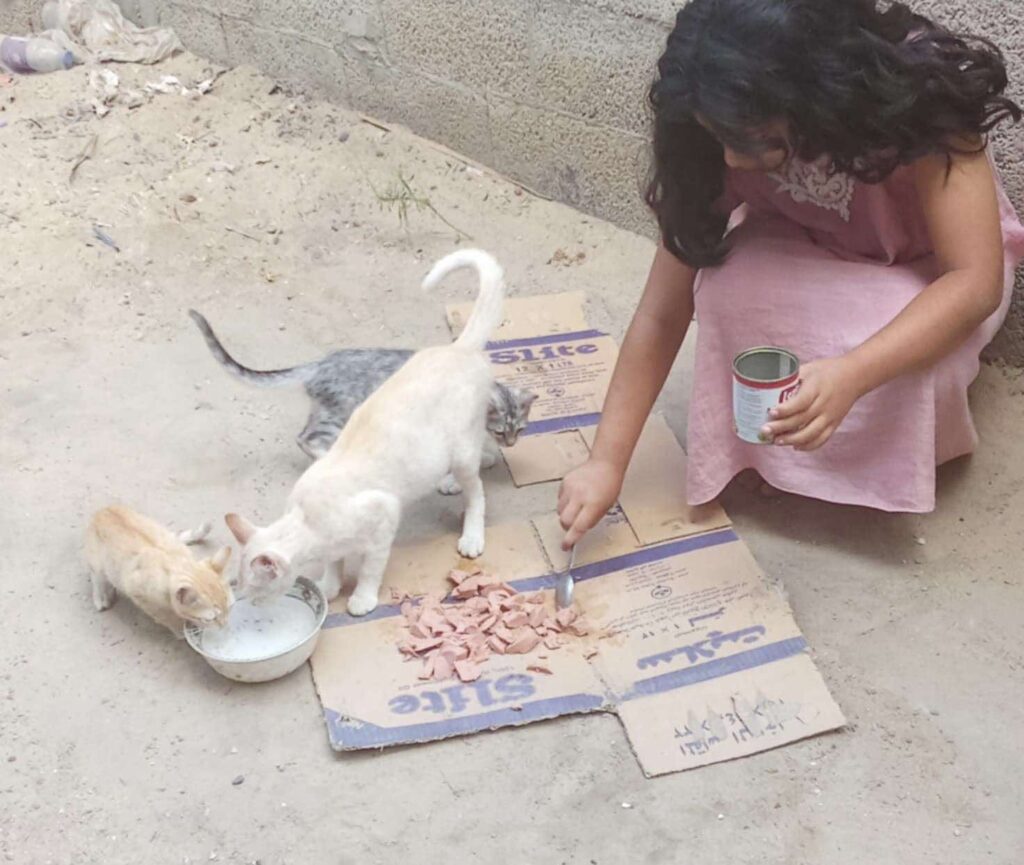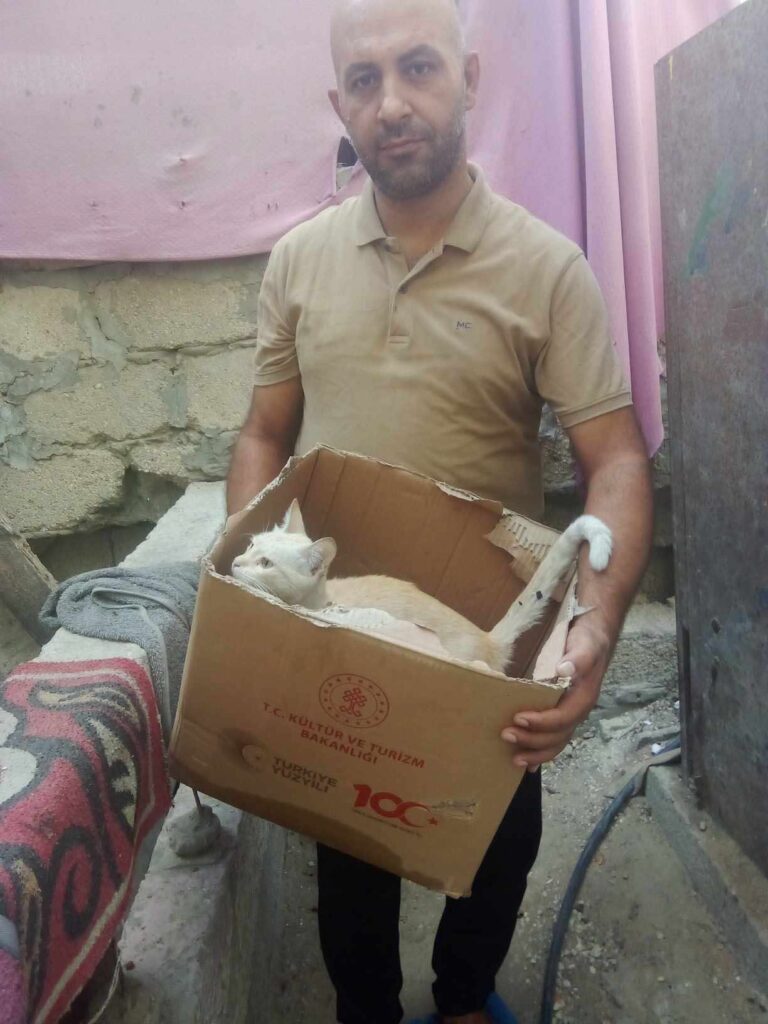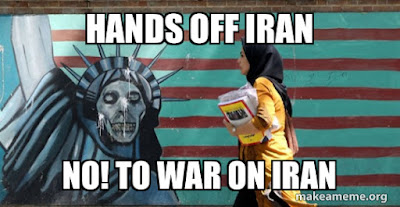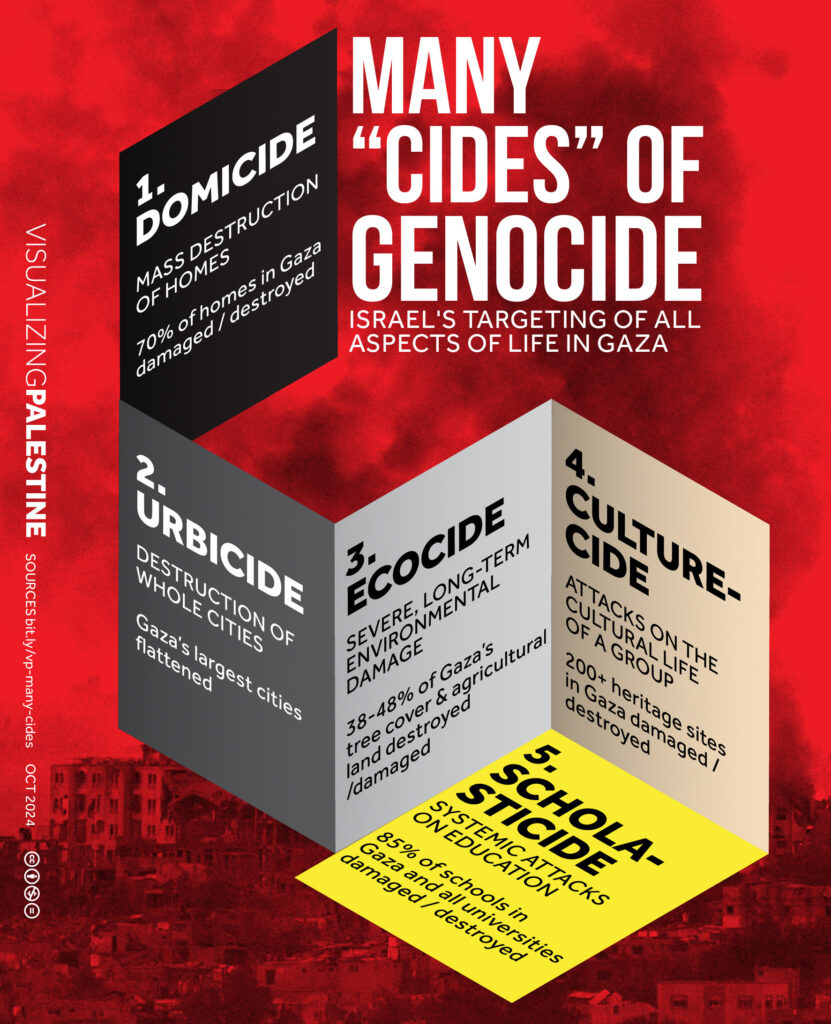The Cats of Gaza
Nine-year-old Jana ignores the gunfire in the distance as she carries a cardboard box across the sand. The box contains her best friend: a four-month-old orange-white kitten that bears her name and cuddles with her when the bombs are falling. A few meters behind her, her twelve-year-old sister Nada carries one of the kitten’s siblings, a silver-grey tabby who likewise shares her name. Their father, Salah El-Din Youssef, named the kittens after his daughters so the girls would become attached to them. He didn’t have to bother. They would have loved the kittens no matter what their names were. And, judging from the calm, serene looks on the kittens’ faces as they peek out over the tops of the boxes, they trust the girls enough to love them back.
Though the sisters occasionally stumble over rocks and debris beneath the hot summer sun, they don’t mind because they know their journey is almost over. Their father has secured a spot on the beaches of Der al-Balah where they can live. They can almost hear the cool sea breeze whispering their names as they get closer. Their father follows them with a box containing the mother cat, Kitty, and another silver-grey tabby kitten named Angie. Salah is relieved. No one in the family was killed or injured during the evacuation, and they were able to take what little they owned. Salah’s wife, Samaher, and their three other daughters, Dana, Yara, and Rahaf, are tidying up the new tarp and stick home when they arrive. They haven’t felt this safe in a while.
Two days ago the Israelis dropped evacuation orders on their camp. We are liberating you from the tyranny of Hamas. Your zone will become a battlefield. You must leave immediately.
Some screamed in response, others silently panicked. The attack could come at any moment. Scattered refugees ran here and there, unsure of where to go. Whole families scurried through the streets carrying as much as they could. Heavy items lay discarded in abandoned camps, too burdensome to move. Everything was pared down to food, clothing, and documents. Flour, lentils, cooking oil. Shoes, shirts, headscarves. ID, birth, and death certificates. Everyone carried something. The sick carried the sickest. The young carried the youngest.
The cats are lucky. They’ve become items of necessity in the middle of a calamity. Who would want to face death without a friend? Salah found Kitty in early spring. Her kittens were born on April 25th. He adopted them all.
“I treat them as if they were my children. I eat and drink from God’s provisions, and my children do the same.”
Between the rockets and hunger, these bundles of soft, warm fur make life more tolerable.
“All the children here love to play with Kitty and her kittens. They were all happy when she became a mother and gave birth to these beautiful babies.”
In a far cry from his pastry chef days before the war, Salah and his family start each day collecting enough food for one meal which they share with the cats.
“My older brother, Ezz, and my younger nephew, Hamoud, like to help. Sometimes Hamoud has to walk long distances to find the type of luncheon meat the cats like. They demand the best—standard cat behavior! Kitty supplements her diet with the occasional bird, though I have never seen her catch a mouse.”
Kitty is often thirsty. This is the end of the dry season, and there is little water available on the streets. When Salah brings out a bowl of water, Kitty laps it down as fast as she can.
Salah feeds and frets about all of the homeless cats the way any animal lover would. When he has the time and money, he buys several cans of potted meat and goes to the areas with an abundance of strays. Dozens of cats come running whenever he calls. It reminds me of a Siamese cat I had as a kid. Every day after school I would stand behind our apartment building and yell out his name: Sudene! Within seconds he would come bounding out of the woods to greet me. Those were the happiest moments of my childhood. In a land where happiness is scarce, those moments mean even more. They help Jana and Nada cope. Salah shows me photographs of them before the war, dressed like pop stars. T-shirts, jeans, and purses. Sunglasses perched atop their heads. Faces decorated with smatterings of lipstick and blush, as they play grown-up. Now here they are in tattered clothes, singing lullabies to kittens in the middle of a genocide. Hush little baby, don’t you cry…sounds soothing no matter what the language.
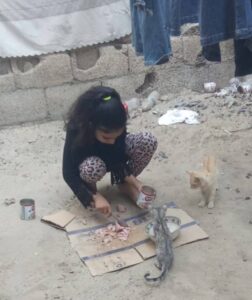 Like most Palestinians, Salah’s family mimics a feral cat colony full of multiple generations of felines trying to make it in the world. Besides his wife and five daughters, Salah has three brothers and two sisters, each with families of their own. Before October 7th, they all lived on the same block. Now, they live on the ruins of blocks, moving every few months during the forced evacuations, always keeping together. Like the cats he feeds, they live and die in close proximity to each other. And with each bombing, there’s a chance they will all be wiped out.
Like most Palestinians, Salah’s family mimics a feral cat colony full of multiple generations of felines trying to make it in the world. Besides his wife and five daughters, Salah has three brothers and two sisters, each with families of their own. Before October 7th, they all lived on the same block. Now, they live on the ruins of blocks, moving every few months during the forced evacuations, always keeping together. Like the cats he feeds, they live and die in close proximity to each other. And with each bombing, there’s a chance they will all be wiped out.
The cats sense something is wrong when the humans leave the camps. But, unlike stray dogs, they don’t follow. They won’t leave their territories until it’s too late. Only the lucky survive.
Refugees call the cats martyrs when they die. Every innocent creature in their beloved land becomes a martyr when it is murdered. Even their national symbol, the olive tree, is martyred by D9s, Israel’s armored bulldozers.
The cats of Gaza watch our foolishness and folly, as well as our sacrifice and struggle. If they could talk, in between the pets and meows, they would have incredible stories to tell.
Salah’s family has a story too. “My father was killed by the Occupation before the war. He needed surgery abroad, but the Israelis would not allow him to leave. Now my mother, Ummah, is in the same situation.”
Ummah had been injured in a rocket attack. Their neighbor’s house had been blown to pieces and a cinder block fell on her leg, breaking her femur. She spends her days lying on a mattress on the dirt floor, unable to move. Sometimes Salah is able to get medicine for her diabetes. Often she goes without. Medical care in Gaza is limited, especially for adults. Children are more likely to get what little treatment is available. The old are requisitioned to die young. Mothers and fathers are forced to bury, or be buried by, their children. No family in Gaza escapes unscathed.
In the middle of June, after eight months of war, Salah’s tent was burned down by incendiary weapons. The Occupation uses them to scorch the earth and make the land uninhabitable. The family evacuated, with Kitty and her kittens, to the Al-Mawasi/Khan Yunis “humanitarian zone,” where the IDF (Israeli Defense Forces) could kill them more efficiently. They had no shelter when they arrived, and for a while, they slept out in the open beneath the stars, too poor to buy a two-hundred-dollar tarp or a thousand-dollar tent.
In mid-July Salah’s twenty-something nephew, Adi, broke his hand running from a missile attack. Now he has to struggle to survive one-handed. No one gets time off to heal. A few days later Salah had to go to the hospital. The salty water they had been drinking gave him a kidney stone. He spent three days at the hospital waiting for the stone to pass, because it was too painful to walk back home. Salah sent me a video of Jana feeding the cats while he was gone, in addition to one of Nada singing for peace in Arabic. Google Translate filled in the main points of the lyrics, even if some of the sentences made no sense. Nada sang to the world, demanding the right to be heard, to play with friends, to be loved by her parents, to have her own home, to go to school, and to live without fear. In response, we pretend they’re all terrorists and encourage Israel to bomb them at taxpayers’ expense. Palestinians use their blood to pay the rent. Remember when the Zionists said, “Never forget!”
On July 24th, Salah’s uncle Ramzi and two of his sons, Diaa and Badr, suffered severe burns in a missile attack. They were taken to the Al-Aqsa Martyrs Hospital in Deir al-Balah. It has the best care in the Gaza Strip. And that’s a problem, because it’s full, and they’ve run out of supplies. Salah asked me to contact the medical charity I’m friends with, but I doubt they will be able to help.
Badr dies first. He was only ten years old. Salah sends me a photograph of him playing games on a smartphone. He’s an innocent-looking boy with short black hair and dark brown framed glasses. Ramzi prayed for death when he learned of his son’s passing. His wish was granted a few hours later. Only Diaa survives, facing a long, nightmarish recovery sans skin grafts and painkillers.
Badr’s older brother Ibrahim published a memorial to him on social media: My little brother, a piece of my heart, if it is true to say, you left us, returning to the gardens of eternity, God willing, a martyr and a bird in paradise. You were a full moon that illuminated my life. My words are powerless before you. I regret all the moments that I could not be by your side and the feeling of helplessness that possessed me in your last days, while you told me I would get out of here safely! I, who was your older brother, could not do anything for you in the midst of this cruel war. May God have mercy on you, Badr el-Din.
I told Salah the people at the charity saw my message but never responded.
“Don’t worry,” Salah replied. “God will help us.”
On July 26th, Salah sent me a video of the funeral procession. Orange stretcher, white shroud, mass grave. They do about a hundred ceremonies a day. In this madness, guilt marries shame. Prayers and prostrations can’t overcome pain.
On July 27th, the school adjacent to the area they were camping in was targeted with rockets. Thirty-one died and one-hundred-and-fifty were injured. I suppose God did help Salah—none of the casualties were family or friends.
In the middle of August, Salah’s teenage nephew Qusay had his thumb torn off by shrapnel. His crime? He was shopping with his father. The IDF bombs markets when the refugees have enough food or merchandise to sell.
Later that week, Salah receives flour from friends in Egypt and sends me photographs of it. Even simple things become important life events.
The children get new clothes. Jana, in a black top, white and purple leopard print leggings, and a ponytail, feeds the cats. Nada, clad in a pink dress, hair undone, gives them water. The girls are blessed. How can God deny their entry into Paradise after death?
In early September Salah’s cousin, Dr. Moin Fares Youssef, is killed. He spent fifteen years in Israeli prisons only to be martyred in his own home upon release. There’s a story there, but I never ask Salah what it is. I’ve already learned enough.
As fall begins, Salah sends me a photograph of Kitty nursing four new kittens, eyes unopened. Two orange, one white, and one calico. Someday, when all the wars end and the humans disappear, the cats will still be there: purring and sunning themselves like they’ve always done.
You can find out more about Salah El-Din Youssf at his GoFundMe
